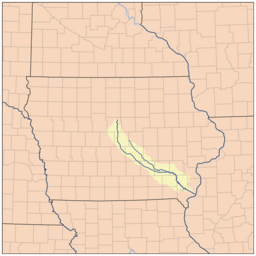Skunk River
| Skunk River | |
| River | |
| Country | United States |
|---|---|
| State | Iowa |
| Districts | Lee County, Iowa, Des Moines County, Iowa, Poweshiek County, Iowa, Henry County, Iowa, Jefferson County, Iowa, Washington County, Iowa, Keokuk County, Iowa, Jasper County, Iowa, Story County, Iowa, Mahaska County, Iowa |
| Tributaries | |
| - left | South Skunk River |
| - right | North Skunk River |
| Source | |
| - coordinates | 41°14′53″N 92°01′34″W / 41.248°N 92.026°W |
| Mouth | Mississippi River |
| - location | Burlington, Iowa, US |
| - elevation | 522 ft (159 m) |
| - coordinates | 40°41′53″N 91°06′54″W / 40.698°N 91.115°WCoordinates: 40°41′53″N 91°06′54″W / 40.698°N 91.115°W |
|
Map showing the Skunk river, including both branches.
|
|
| U.S. Geological Survey Geographic Names Information System: Skunk River | |
The Skunk River is a 93-mile-long (150 km)tributary of the Mississippi River in the state of Iowa in the United States.
The Skunk River rises in two branches, the South Skunk (185 miles (298 km) long) and the North Skunk (129 miles (208 km) long). The headwaters of the South Skunk are in Hamilton County in north central Iowa. It flows roughly due southward, to the west of Interstate 35, and passes through the city of Ames, before turning southeasterly. In Keokuk County, it is joined by the North Skunk, which has its headwaters in Marshall County. It then proceeds southeastward and flows into the Mississippi about five miles south of the city of Burlington.
The Sauk and Meskwaki referred to the Skunk River as "Shecaqua". This name was probably mistranslated; one early settler wrote, "I was informed by Frank Labisner, United States interpreter for the Sac and Fox Indians, that the name of Skunk River was a wrong interpretation. The Indian name was Checaqua. which, in their language is anything of a strong or obnoxious smell, such as onions. I think, that from the fact that the head waters of the stream abounded with wild onions, the interpretation should be 'Onion.'"
Species of fish found in the Skunk River include smallmouth bass, gar, walleye, catfish, carp, bluegill, sheephead, bullhead, and largemouth bass.
The "Skunk River Navy", founded and led by Iowa State University biology professor 'Admiral' Jim Colbert, contributes to monitoring the biological diversity of the South Skunk River, and some of its tributaries, near Ames, IA. Participation in the SRN is focused on students entering Iowa State in the biology major, and completely voluntary. The SRN has been operating each September since 1998 and during that time about 2,000 volunteers have removed over 71 tons of trash from the river.
...
Wikipedia

